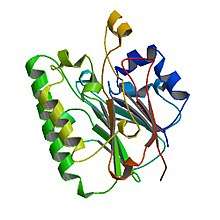Crc (protein)
The Catabolite repression control (Crc) protein participates in suppressing expression of several genes involved in utilization of carbon sources in Pseudomonas bacteria. [2]Presence of organic acids triggers activation of Crc and in conjunction with the Hfq protein genes that metabolize a given carbon source are downregulated until another more favorable carbon source is depleted.[3] Crc-mediated regulation impact processes such as biofilm formation,[4] virulence [5] and antibiotic susceptibility.[6]
| Crc | |||||||||
|---|---|---|---|---|---|---|---|---|---|
 Crystal structure of Crc in Pseudomonas aeruginosa.[1] | |||||||||
| Identifiers | |||||||||
| Symbol | Crc | ||||||||
| Pfam | PF03372 | ||||||||
| CDD | cd08372 | ||||||||
| |||||||||
Interactions
A consensus sequence targeted by Crc mediated regulation
Hfq and Crc bind to A-rich sequences in the ribosome binding sites of genes that code for carbon utilization enzymes and consequently suppress their translation.[7]
gollark: I am *not*, since going around punishing for speech (except in rare cases of direct harm) is a very problematic and slippery slope.
gollark: If you give governments or whoever the power to go around getting rid of speech *you* don't like, they can happily proceed to do it to speech you like too.
gollark: If you can consider "saying the government is bad" harm you can consider "talking about some religion/participating in it" harm.
gollark: Some governments may not see it that way.
gollark: Terrorism is pretty rare and a stupid thing to base significant aspects of policy on.
References
- Wei Y, Zhang H, Gao ZQ, Xu JH, Liu QS, Dong YH (January 2013). "Structure analysis of the global metabolic regulator Crc from Pseudomonas aeruginosa". IUBMB Life. 65 (1): 50–7. doi:10.1002/iub.1103. PMID 23281037.
- Ramos, Juan-Luis (2004-06-17). Virulence and Gene Regulation. Springer Science & Business Media. ISBN 978-0-306-48376-9.
- Sonnleitner E, Bläsi U (June 2014). "Regulation of Hfq by the RNA CrcZ in Pseudomonas aeruginosa carbon catabolite repression". PLoS Genetics. 10 (6): e1004440. doi:10.1371/journal.pgen.1004440. PMC 4063720. PMID 24945892.
- O'Toole, GA; Gibbs, KA; Hager, PW; Phibbs, PV jr; Kolter, R (2000). "The global carbon metabolism regulator Crc is a component of a signal transduction pathway required for biofilm development by Pseudomonas aeruginosa". J Bacteriol. 182 (2): 425–431. doi:10.1128/jb.182.2.425-431.2000. PMC 94292.
- Zhang L, Chiang WC, Gao Q, Givskov M, Tolker-Nielsen T, Yang L, Zhang G (December 2012). "The catabolite repression control protein Crc plays a role in the development of antimicrobial-tolerant subpopulations in Pseudomonas aeruginosa biofilms". Microbiology. 158 (Pt 12): 3014–9. doi:10.1099/mic.0.061192-0. PMID 23023972.
- Yeung AT, Bains M, Hancock RE (February 2011). "The sensor kinase CbrA is a global regulator that modulates metabolism, virulence, and antibiotic resistance in Pseudomonas aeruginosa". Journal of Bacteriology. 193 (4): 918–31. doi:10.1128/jb.00911-10. PMC 3028677. PMID 21169488.
- Sonnleitner E, Bläsi U (June 2014). "Regulation of Hfq by the RNA CrcZ in Pseudomonas aeruginosa carbon catabolite repression". PLoS Genetics. 10 (6): e1004440. doi:10.1371/journal.pgen.1004440. PMC 4063720. PMID 24945892.
This article is issued from Wikipedia. The text is licensed under Creative Commons - Attribution - Sharealike. Additional terms may apply for the media files.